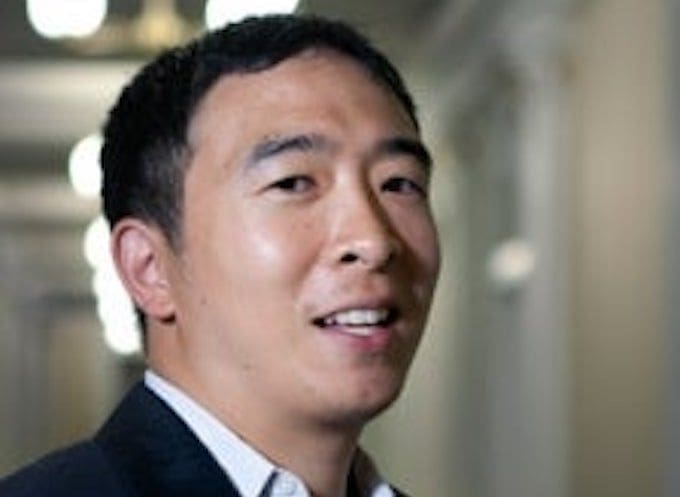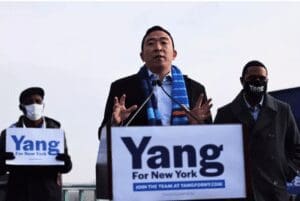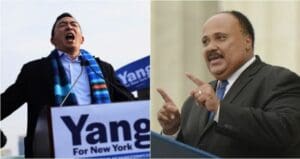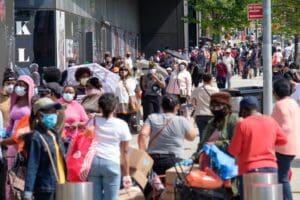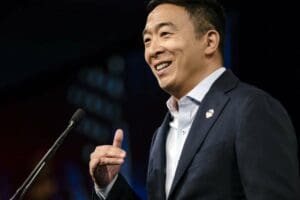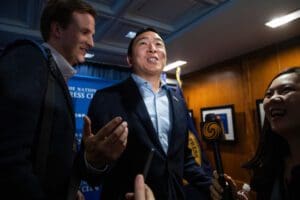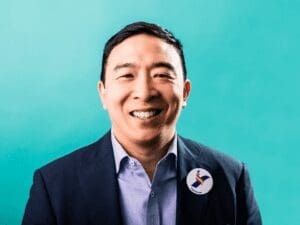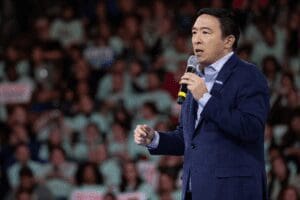Andrew Yang has managed to stay in the Texas Hold’em tournament past the first bubble. Unlike other outsiders, he hasn’t been voted off the island or down-selected or pick-a-metaphor-of-your-preference. He’s going to be on stage for the September 2019 Democratic candidate debate. And so, his signature-policy Freedom Dividend, a universal basic income for Americans, remains worthy of assessment and analysis. I first published on basic income approaches almost three years ago, an article which was recently relevant again given Elon Musk’s support for Andrew Yang. So let’s assess and analyze, shall we?
I’ll excerpt aspects of my older article as it provides a useful definition and a set of value propositions, often contradictory, that different stakeholders place on basic income. Then I’ll assess Yang’s Freedom Dividend against the definition and the value propositions to at least articulate it that far. Consider it a filter or sieve.
What is a basic income?
This is actually a harder question to answer than it should perhaps be, and the reason why will be more fully explained in the next section around competing motives for providing one. That said, it has some or all of the following characteristics:
- • Broadly provided to a significant percentage of the population, from anyone below a certain income to everyone
- • Automatically disbursed to individuals, typically on a monthly basis, typically to their bank accounts — although, at least one Libertarian advocates an annual grant
- • Not means-tested, so it does not get downgraded if someone becomes employed
- • Lasts an extended period of time, from two years to life
- • Is sufficient to enable a person to acquire basic shelter and food, the basis of Maslow’s suggested Hierarchy of Needs, although some proposals are below the poverty line and none appear to be sufficient to support a person in a major world city
What are the major divisions related to basic income?
There are explicitly socialist/collectivist and explicitly libertarian/individualist perspectives and value propositions which can substantially change the nature of what is proposed. Note that while I’ll get to the specifically American perspective at the end, I’m starting with the broader global perspective.
- Protect people from rapid change VS Enable people to participate in rapid change
- In addition to targeted social services VS Instead of targeted social services
- People in need VS Everybody
- More governmental support of citizens VS Smaller government
- Enable communal living VS Enable individual choice
- Paid for with more taxes and less military VS Paid for by cutting other social programs
- Nordic leisure ethic VS Protestant work ethic
- Redistribution of wealth VS Redistribution of labor
- Jobs out of choice VS Jobs due to necessity
- Utopian VS Utopian (with very different visions of utopia)
For fuller definitions of the divisions, feel free to see the source article, however, most points lacking clarity will become clearer as I assess Yang’s Freedom Dividend. Where it seems necessary, I’ll elaborate.
What aspects of basic income does the Freedom Dividend include?
This assessment will likely be unable to determine all points, as politician’s public platforms are typically sales pitches more than detailed policy statements. All data for the Freedom Dividend come from Yang’s campaign site: The Freedom Dividend – Andrew Yang for President including the separate FAQ page. Let’s assess the elements I identified in the global assessment of basic income one by one.
Broadly provided to a significant percentage of the population, from anyone below a certain income to everyone
The Freedom Dividend is intended to be provided to “every American adult over the age of 18.” This is reasonably aligned with many basic income schemes as they are often for adults, with different programs providing parents with support. However, the language on child support in the Freedom Dividend text is ambiguous as there is no reference to a child support policy separate from the Dividend in Yang’s platform. There is a plank increasing support for single parents, but this is poorly aligned, but still of value as the analysis draws out later.
Starting the dividend at 18 is interesting as well. Why not 16, the age of driving? 18 is the age when citizens are enfranchised and eligible to vote, and an age when many young adults are entering school. But some students enter vocational and trade schools prior to 18. Why not at birth, allowing the money to be put aside for university? What about homeless children? This is a policy aimed at adults, and for fairly specific reasons as the assessment shows.
Automatically disbursed to individuals, typically on a monthly basis, typically to their bank accounts — although, at least one Libertarian advocates an annual grant
The Freedom Dividend promises that everyone over 18 would “receive a check for $1,000 a month every month.” This is interesting because many of the most disadvantaged are unbanked or underbanked, meaning that they don’t have bank accounts or access to banking services. About 55 million Americans or 22% of households fall into this category. They typically end up relying on predatory payday check cashing and loans services.
Would the Freedom Dividend allow these people to gain full access to banks? Not by itself. But it’s more than just economic security of $12,000 per year which allows people to maintain banking services. The homeless and institutionalized, the most needy in society, often have no fixed addresses, a requirement for banking. That’s why many social service academics recommend the basic income as something in addition to the other social services, not the only choice.
A key point of the policy addresses this in part: “It will be illegal to lend or borrow against one’s Dividend.” That addresses payday loan services, but not check cashing service, which often charge 10%-12% to cash cheques, an order of magnitude higher than banks typically charge. This means that those 22% of Americans most in need could potentially be turning over $100-$120 per month to predatory agencies.
However, Yang’s policy team is aware of this problem. A related Yang policy is to Provide Basic Banking Services Through the Post Office. Is this perfect, or encompassing of the scope of the problem, or workable? That’s not the point of this assessment, but to be clear many countries do provide this type of service and the USPS is looking for new business to counteract the disruptive rise of couriers and the Internet. The idea has merit, but I won’t assess the specifics.
Not means tested, so it does not get downgraded if someone becomes employed
The Freedom Dividend meets this. Everyone over 18 gets it regardless.
Lasts an extended period of time, from two years to life
The Freedom Dividend lasts until the death of the citizen, 18 to grave.
Is sufficient to enable a person to acquire basic shelter and food, the basis of Maslow’s suggested Hierarchy of Needs, although some proposals are below the poverty line and none appear to be sufficient to support a person in a major world city
The Freedom Dividend’s $12,000 per year is just above the poverty threshold in the US: “the poverty threshold for a single person under 65 was an annual income of US$11,770; the threshold for a family group of four, including two children, was US$24,250.” Note that two parents with two kids under 18 are just under the poverty threshold and there’s no mention of matching child benefits, so that’s a wrinkle that will need to be ironed out too.
But let’s take the last clause from the earlier assessment: “none appear to be sufficient to support a person in a major world city.” That’s true of Yang’s Freedom Dividend as well. Average rents in Silicon Valley for one-bedroom apartments are $2,640-$3,000 per month. No one living in the Bay area is going to even be paying rent with the Freedom Dividend, never mind eating, paying data plans, or getting around.
How does Yang’s Freedom Dividend fit in the major divisions?
Let’s turn to the set of ten perspective variances identified in the earlier analysis among basic income advocates focused on collective well-being vs individual liberty.
Protect people from rapid change VS Enable people to participate in rapid change
Two of the first four stated advantages in Yang’s Freedom Dividend FAQ are about getting people into jobs and increasing entrepreneurship. This is less of a social safety net than something focused on getting people to contribute to the new economy. Definitely a libertarian-slant to Yang’s policy, and likely one which will appeal to many Democratic voters and a lot of Independent voters as well. It won’t sway the Republican base, but very little would. The latest Gallup polling has voters identifying as Independent at 38% of the electorate, and this is the primary target.
In addition to targeted social services VS Instead of targeted social services
The second line of the Freedom Dividend advantages FAQ is “UBI reduces bureaucracy” and under the category of how it will be paid for, the first answer is consolidating (eliminating) existing social programs. This isn’t in addition to targeted social programs for the temporarily or permanently disadvantaged, this is intended to replace as many of them as possible. Definitely the non-collectivist view on basic income.
What’s interesting is that this is getting rid of jobs, as the people administering and delivering those social programs have gainful employment today, but in many cases wouldn’t after the Freedom Dividend goes through.
There are a couple of already excluded programs: Social Security and Veteran’s Disability benefits. Those programs are promised to remain untouched and further that the basic income will be additive to them. That’s a big deal for fixed income seniors and the men and women who have come back from American’s foreign military endeavors with challenges that make it difficult for them to engage fully with the work force. Those are both very reasonable exclusions, and politically very important. Those are two major voting blocs you really don’t want to tick off in the US.
People in need VS Everybody
This is part of the more libertarian-lite perspective. Everyone gets it, even the very rich, because that’s simple and has limited bureaucracy. And then it’s taxed, and at the highest marginal rate for the 1%, so a lot of it gets clawed back, but simply as a line item on their tax returns, something that’s not going away. That’s arguable either way, but is a data point to consider in the policy design.
More governmental support of citizens VS Smaller government
The Freedom Dividend is very definitely a smaller government policy. When it talks about reducing bureaucracy, that’s public sector workers in the cross-hairs and when it talks about eliminating social programs, that’s reducing the complexity of services that is typically required for large groups of the at risk.
Enable communal living VS Enable individual choice
The Freedom Dividend is silent on this. People pooling their dividends to live comfortably in artistic or agrarian utopias just doesn’t fit with the branding. But it’s a reality that some people will do exactly that, just not very many in the very individually oriented US. While many global basic income advocates care deeply about this aspect, it’s not that relevant in the US political context.
Paid for with more taxes and less military VS Paid for by cutting other social programs
The Freedom Dividend is somewhere on the middle of the scale on this, although a bit to the right. The first method of payment is by consolidating social programs and hence firing a lot of the people who administer and deliver them. The Dividend is completely silent on the military, which makes sense as it’s a third-rail topic for many Independents and virtually all veterans, but it is explicitly talking about a new tax, a Value-added Tax. That’s a tax that businesses pay on the goods and services that they consume in creation of their goods and services, less any taxes already paid along the supply chain. This is explicitly a tax on businesses, but consumers will end up with higher consumer prices as businesses will pass the costs along. It’s a very widely used taxation approach, used in 160 or so countries globally.
Obviously it adds bureaucracy for businesses. Some critics assert that it’s a regressive tax as it puts a burden on the lowest income earners, but also obviously when paired with giving lower income consumers money that argument becomes moot.
And taxing businesses to pay for the basic income makes sense. As automation, AI or not, increasingly reduces labor requirements, businesses will still be making money. One of the side effects of potential massive unemployment due to increasingly smart machines is that income taxes on citizen’s salaries just won’t pay for governmental services.
Nordic leisure ethic VS Protestant work ethic
A great deal of the literature on basic income comes down to a moral perspective on what things are valuable for humans to do with their time. The Danish word hygge, roughly translated as cozy contentment, entered the lexicon of many millennials in the past few years. The European extended holidays vs the two-week breaks which many Americans don’t bother taken is another aspect of this dichotomy.
You have to get a long way down the list of Freedom Dividend benefits before you find anything that isn’t more about jobs than alternatives to jobs. #8 is “UBI increases art production, nonprofit work and caring for loved ones.” Even then it’s about a “supplementary income for those interested in labor that isn’t supported by the market,” not a full living for people who choose not to work.
In other words, this isn’t a post-scarcity economic policy as Musk envisions, but a labor policy. And given the perspective of the US and the point in time, this is probably the right selling point and approach, as foreign as it might be to many Europeans.
Redistribution of wealth VS Redistribution of labor
The Freedom Dividend is really about making it easier for people to find jobs, retrain for jobs and move to where jobs are. It’s not giving money to people because society is awash in it and we don’t need as many workers as we have people, but about businesses being able to get the workers they need. The balance is definitely toward redistribution of labor.
Jobs out of choice VS Jobs due to necessity
The Freedom Dividend is somewhat split on this. It claims a benefit of increased negotiating power for the individual — not collective agreements, but greater individual empowerment to say no to bad employment — but it’s still focused on specifically employment and labor markets. People receiving the Freedom Dividend still need jobs, other income or pooling resources in low-cost living arrangements to get by.
Utopian VS Utopian (with very different visions of utopia)
Reading through the literature on basic income, the following split became apparent in perspectives: “Socialists believe that this will make humans fundamentally better people and the Libertarians assert it will eliminate inner city crime.” These are utopian ideals, and the good news about the Yang Freedom Dividend is that it isn’t particularly utopian. It doesn’t think it’s going to change human nature or fix every problem in the world. It isn’t a post-scarcity wealth distribution plan suitable for our AI overlord future.
It does point to some non-labor market benefits that aren’t utopian, but which have to be carefully considered given the diverse nature of what has been implemented under the banner of basic income programs in various parts of the world: increased health, increased mental health, improved relationships, etc.
But it does state that domestic violence and child abuse are reduced. This mostly comes from having sufficient personal fiscal resources as a mother to leave abusive relationships. And it’s paired with a policy devoted to providing more for single parents(not just single mothers, by the way, although it acknowledges the large majority are single mothers). That’s a very reasonable outcome, as long as other programs devoted to providing safety and support for abused partners and children aren’t eliminated in favor of the basic income. The majority of those programs are managed at the state, municipal or charity level, so it will cause some disruption in some of those areas, but the federal government won’t be directly cutting those programs either. Others will assess the downstream impacts of this in the USA at a state-by-state, municipality-by-municipality, and charity-by-charity level. There’s a PhD thesis or 15 in there.
A few outstanding questions (& my opinions)
Is Yang’s Freedom Dividend a perfect implementation of a universal basic income? I think that the point is that there isn’t such a thing. There are different value propositions which are justifiable based on the moral lens different people apply to labor, leisure and multiple other factors.
Is it a pretty decent policy and something that needs to be injected into discussion as we move rapidly into the future? Yes, which is why there are so many experiments with it globally, from Ontario to Finland to Silicon Valley billionaire’s personal programs (not Yang, incidentally). And why Elon Musk is strong on this point.
Will job losses due to increasing use of narrow artificial intelligence mount? That’s arguable, but the weight of the argument is on the side of much more rather than much less labor dislocation in a shorter period of time than we have historically experienced it. Regardless of anything else, many jobs which people have today will disappear and they will need to take relatively different jobs that emerge in the new economy. They’ll have to retrain. They’ll have to move. They’ll have to adapt. And a basic income is a policy mechanism that would assist them.
Is Yang’s Freedom Dividend a post-scarcity, Star Trek economy policy? No. It’s grounded in the realities of the 21st Century. The basic income Musk and many others see as necessary isn’t the Freedom Dividend. But Elon Musk is an incrementalist, not a revolutionary. His 2015 beta Autopilot is leading to Level 4 and 5 autonomy, but he doesn’t let the perfect be successful as the enemy of the good. It’s unclear how deep Musk is on Yang’s implementation, but I can’t see him disagreeing with the choices in the US context.
Will Yang’s Freedom Dividend be implemented in the US? My bet is not a chance, not right now. It’s injected into the political discussion, but Yang’s chances of being the Democratic Candidate are incredibly slim as he’s not among the four front runners — Biden, Warren, Sanders, and Harris — and if he does manage to squeak into the Presidency, he’d have to get this through both Houses. After all, it does include a tax increase, something that is anathema to virtually all Republicans and many Democratic politicians after the warped economic discussions and actions of the past 30 years.
Yang’s Freedom Dividend is an implementation of the universal basic income tailored for the US in 2020, and tailored to win over Democratic and Independent voters. If it were to be implemented, it would undoubtedly change, but it’s a useful step along the path to a future where changes are accelerating and people outnumbers paying employment positions. It’s good that Yang has injected it into the US political arena.











